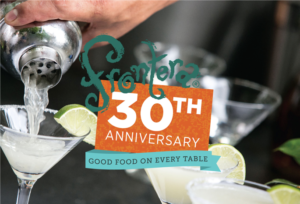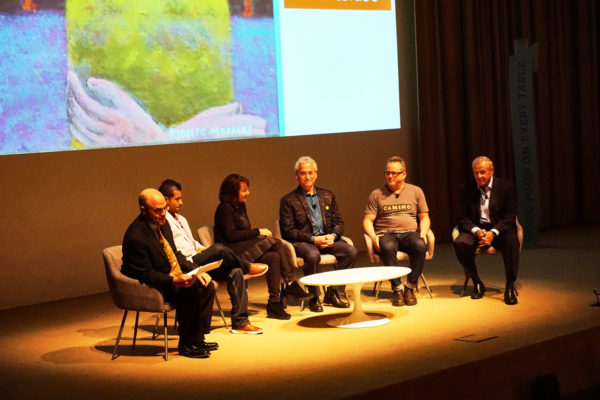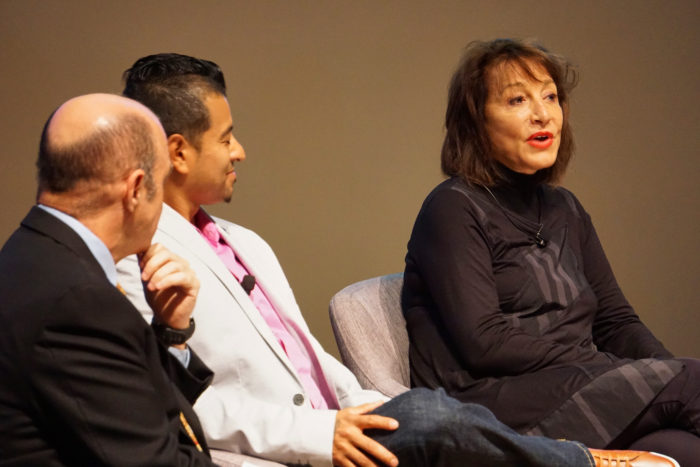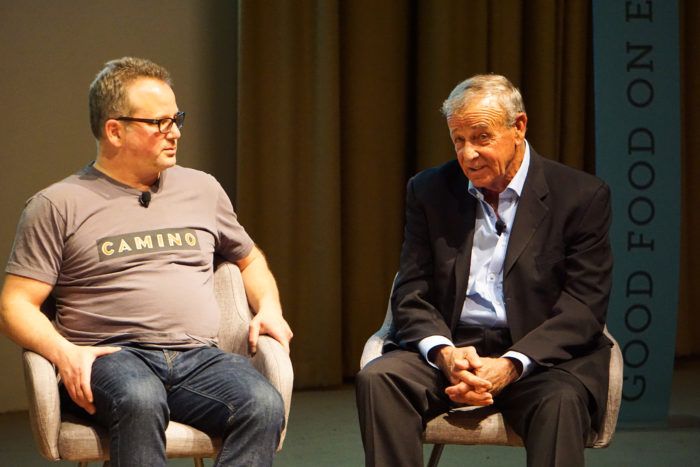by Bob Benenson, FamilyFarmed
The Frontera 30th Anniversary Celebration at The Art Institute of Chicago April 30 drew more than 700 attendees — and generated more than $100,000 in proceeds for FamilyFarmed and Chef Rick Bayless‘ Frontera Farmer Foundation to expand their efforts to help Midwestern small farmers and food entrepreneurs. The big draw was an epic tasting party, featuring culinary magic from more than a dozen world-class chefs, to commemorate the opening of Rick’s landmark Frontera Grill in 1987.
It was a bit of a gamble for the Frontera 30 team to precede the Celebration with The Good Food Forum: A Bold Vision for the Future of Food. Given that most in the audience were anxious to eat, drink and be merry, the hour-long symposium could have be a buzzkill.
But it was quite the opposite. The enlightening, engaging and passionate discussion among five Good Food activists and leaders was deftly moderated by Peter Sagal of NPR’s popular program “Wait, Wait… Don’t Tell Me.” And it turned out to be a perfect set-up for the food and frivolity that followed.
 The organizers received positive feedback from multiple attendees, who said the Good Food Forum put into context the issues addressed by Frontera Farmer Foundation and FamilyFarmed. They said it left them with a greater understanding about what needs to be done to create a better food system in the United States, one that is healthier, more environmentally sustainable and more economically dynamic.
The organizers received positive feedback from multiple attendees, who said the Good Food Forum put into context the issues addressed by Frontera Farmer Foundation and FamilyFarmed. They said it left them with a greater understanding about what needs to be done to create a better food system in the United States, one that is healthier, more environmentally sustainable and more economically dynamic.
The panelists, in alphabetical order, were Fedele Bauccio, founder of San Francisco-based Bon Appetit Management Company, which added flavor and sustainability to institutional catering (and which manages food services at The Art Institute of Chicago); Paul Kahan, the chef at the center of Chicago’s successful One Off Hospitality Group, and a powerful advocate for local food sourcing and childhood food education; Nora Pouillon, whose Restaurant Nora in Washington, D.C. was the nation’s first certified organic restaurant (and who helped create the farmers market network in Washington, much as Rick Bayless did in Chicago); Eduardo Rivera, a young Mexican-immigrant farmer from Minnesota who received a 2016 grant from the Frontera Farmer Foundation; and Jim Slama, founder, president and CEO of FamilyFarmed
Their discussion followed an inspiring keynote address by Rick Bayless, which is covered in an article published on Good Food on Every Table on May 2 (click here). This site also ran a colorful photo essay of all of the world-class chefs who participated in the event’s “All-Star Culinary Food Court,” published May 3 (click here) and an overview of the whole event published May 4 (click here).
The following is an excepted transcript of The Good Food Forum panel discussion.

The Good Food Forum — which kicked off the Frontera 30th Anniversary Celebration at The Art Institute of Chicago April 30 — provided a lively and stimulating discussion of The Future of Food. Participants (from left) were Peter Sagal, host of NPR’s popular Wait, Wait…Don’t Tell Me program, who moderated; Eduardo Rivera, farmer-owner of Minnesota’s Sin Fronteras farm and a recipient of a 2016 Frontera Farmer Foundation grant; Nora Pouillon of Washington, D.C.’s famed certified organic Restaurant Nora; Jim Slama, president of CEO of FamilyFarmed; Paul Kahan, a proponent of local sourcing through his One Off Hospitality restaurant group in Chicago and of childhood food education through the Pilot Light program; and Fedele Bauccio, who has brought Good Food sensibilities to institutional catering through his Bon Appetit Management Company. Photo credit: Bob Benenson/FamilyFarmed
Peter Sagal: We figured we’d focus on, if you will, in your remarkable and varied careers, the one thing you’ve done that you feel most proud of, and has had the most effect on advancing the Good Food movement. Eduardo, I’ll start with you.
Eduardo Rivera: I guess the thing I’m most proud of is going back to my roots and start my own farm as a person of color. You don’t see very many farmers owning their own business or event their own land, so for me that’s been a big achievement, farming in general….
Nora Pouillon: The thing I’m proudest of is that I started, in the ’70s, to really go back to clean wholesome food, and I went all over the country to find farmers that were growing that kind of food that I was accustomed to. I’m from Austria, if you haven’t detected that from my accent… All this time I was going to find more and more farmers to grow and raise food in a more sustainable way, mainly organically. And then I decided to become certified organic, and I really had to work hard to find someone to do that. It’s lots of paperwork, it takes money. But it was important to show my customers that they can trust me… So in 1999, it took two years I became the first certified organic restaurant in the country and I’m happy I did that.
It goes back to my dad who always said, health is the most important thing you have in your life and you better preserve it because no amount of money in the world can buy it for you…

Nora Pouillion (right) founded starting seeking out local and sustainable farmers in the 1970s, helped establish the farmers market network in Washington, D.C., and in 1979 opened Restaurant Nora, which 20 years later became the nation’s first certified organic restaurant. Her career was honored with the 2017 James Beard Foundation Lifetime Achievement Awards at the annual ceremony held in Chicago the night after the Frontera 30th Anniversary Celebration. Photo: Bob Benenson/FamilyFarmed
Jim Slama: Actually, recognizing [in 2004] that there was no trade show in the natural and organic local food industry, and there needed to be. Starting it was a huge thing… And since then, we’ve really helped to create markets for local sustainable farmers… We’ve helped with many larger scale buyers to connect them with local farmers, local producers and help them get that local food, help them scale up.
Simultaneously, we realized eight years ago that there’s double-digit growth in the local and organic food industry for 30 years, and with that kind of growth businesses need financing, they need capital… So we launched a financing conference [in 2009]… Since then, lots of businesses have pitched, many of them have been financed. We launched our Good Food Accelerator at 1871 [Chicago’s leading business incubator]. Businesses have raised $36 million. And there are real deals happening across the Good Food spectrum that our staff are helping to contribute to, and with your support, they’re going to continue and we’re going to grow this market.
Paul Kahan: I guess my case is one of being in the right place at the right time. A lot of what Rick talked about in the beginning are things that I was kind of along for the ride. I was fortunate to work for Rick and Deann [Rick’s wife] early on at Topolobampo and sort of had the right DNA instilled in me. Before I worked for Rick I worked for this guy named Erwin Dreschler, and he used to take me to that Lincoln Park farmers market. I never really knew a different way to cook and to shop and to run a restaurant than that.
Then I started working for Rick and was fortunate enough to see all this incredible product coming in the door every day, and in this great position to be able to experiment it and work with it and grow with Rick as a chef, and that was an incredible opportunity. So as much as Rick mentored me, I think what I’m most proud of is running a company of 10 businesses at present and more to come with a clear conscience, thinking about sustainability in every way from how we treat people, again all these lessons came in part through Rick and Deann…

Jim Slama of FamilyFarmed relates a story about his career promoting Good Food as Chicago chef Paul Kahan looks on. Photo: Bob Benenson/FamilyFarmed
Fedele Bauccio: We created this tag line “Food Service for a Sustainable Future” a long, long time ago. And I’m convinced that it built the company to over $1 billion today. We’re close to 29,000 people. But the most important thing is last year we served over 200 million meals in the United States, so we had a huge impact in terms of what Good Food is all about… Today we support over 2,000 farmers across the country in 41 states. Over 2,000 small family farms. I’m very, very proud of that and they get their money very quickly, because we’ve figured out how to get that done…
I was on the Pew Commission for three or four years looking at industrial farm animal production systems in this country, which we typically call CAFOs [Concentrated Animal Feeding Operations]… which cause lots of havoc on our society. When I saw the issues of gestation crates and battery cages and how we handle waste and all of those impacts on rural communities, the light bulbs went off and I said to myself, we’re going to build this company and we’re going to be on a journey to fix those issues…
Peter Sagal: Is there anything you haven’t done yet that you want to do or something you weren’t able to do that in some way would push this culture, this cause.
Fedele Bauccio: One is that 80 percent of what we put into our bodies and what we buy in terms of protein is loaded with non-therapeutic antibiotics, and we’ve got to stop that… The only way we’re going to do something about this is for you to go in the grocery store and ask the right questions and look at the local ranchers and try to understand how they raised their animals. Because we have antibiotic resistance in this country, and when we’re sick, we’re going to have a problem.
The second thing is we haven’t fixed the issue of farmworker protection rights. I’ve been in the fields all over the country to see what goes on those workers, and I know there’s an immigration issue, but that’s a big, big issue and I worry about those people. Not enough shade, not enough bathrooms, the pay is low. Who the hell is going to pick our produce and raise the things we need to eat in a sustainable way if we don’t take care of those farm workers? (Loud applause)

Fedele Bauccio (right, with chef Paul Kahan) founded Bon Appetit Management Company in San Francisco 30 years ago to improve the quality of food served by schools, businesses and institutions. He quickly became a passionate supporter of local farmers, sustainable growing and farmworkers’ rights. Photo: Bob Benenson/FamilyFarmed
Peter Sagal: Let me come back to Eduardo. I was reading an interview with you where you were saying you were going into Latino markets in the Twin Cities and you couldn’t convince them to buy your produce because it was more expensive… What are we going to do about that?
Eduardo Rivera: I think we need to have more access to local agriculture and to actually bring more awareness to those farmworkers who are cultivating the food that we eat, who are behind the scenes or cooking the food that we consume. I think we need to find ways to bring the farmworkers or cooks that want to be chefs or the farmers who want to own their own land. There needs to be pathways to be able to achieve that. Right now, there’s not a lot, I don’t see it. That’s why I’m in the food movement right now, because I want to be an example for my own community and say, this is a possibility, you can buy your own land, you can move forward and try to feed your own community…
Peter Sagal: Nora, I know you’re in an interesting position because you’re in the process of closing your restaurant or at least trying to find, let’s say retiring from it. What are you going to do next?
Nora Bouillon: Everybody asks me that. I think what I always wanted to do, and I don’t know if it will ever be realized in my life, is I always wanted to provide healthy wholesome nutritious food to everyone, to underserved communities, to families. My dream was always to have an organic type of McDonald’s. Something that is really accessible for everybody to eat, like two or three times a week, to get food that really helps them stay healthy… Everybody says organic food is too expensive. It depends on what you spend your money on. I always say, would you rather spend the money on food and drink and not on medicine and doctors?…
Peter Sagal: Jim, since you’re the guy who’s most directly involved in making Good Food, sustainable food an ongoing business, what is your take on this consistent issue, that Good Food costs more money and you have to convince people to pay more money for it?
Jim Slama: It’s not just Whole Foods anymore. The largest seller of organic is Costco. Walmart is selling a lot of organic food now. Antibiotic-free chicken and meats are everywhere, it’s across the spectrum. We look at the restaurant industry and see this… The trends are there, and I think in doing so, more and more people are getting access to Good Food…
One of the reasons we’re starting the Good Food is Good Medicine program with Northwestern, we want to teach people in all communities across Chicago… about the connections between eating well, good nutrition and good health. I think there’s a lot of opportunities for all of these things.
Peter Sagal: Paul, one of the things that you do is the Pilot Light Foundation where you’re doing educational programs in schools. That brings up a thing I think a lot about, which is Chicago is very big city with a lot of diverse experiences.
Paul Kahan: We’ve had incredible success working with the teachers on a food-based curriculum that relates to everything that the children study in school: math, science, social studies…We started out with 60 kids and then it’s 180 kids and then it’s 10,000 kids, and we’ve just seen it grow and the children’s excitement, the question they ask. Ultimately we believe we can touch a large portion of the Chicago Public Schools system… It teaches people compassion, it teaches people, when kids learn about other cultures, I think racism will disappear or start to disappear. Food is a tool to fix everything that’s wrong.
Peter Sagal: I was asked by the Frontera Foundation to keep this light and optimistic so, my last question, what would your last meal be?
Fedele Bauccio: I’d have to say a roast chicken… with no antibiotics and was free-range, running around a field. Yes, I’d like a roast chicken.
Paul Kahan: I know it would be simple and light and fresh and someplace incredibly beautiful, maybe the house that my wife and I have in northern Wisconsin, it’s on a beautiful lake… So it’s really much more about the person that what it would be, though it would probably be roast chicken. (laughter)
Jim Slama: A Gunthorp [Farms] pig roast in my backyard… if I’m doing a final meal, I want to do it with 100 of my favorite friends and amazing Good Food.
Nora Pouillon: I think it would be a simple roast chicken with garlic and lemon and rosemary and probably really delicious tomatoes, maybe with some burrata and Austrian toasted pumpkin seed oil.
Eduardo Rivera: For me, it would have to be my mother’s meal that makes for me every time I see her, which in Mexico it would be green chili with pork, wild potatoes and homemade flour tortillas.
